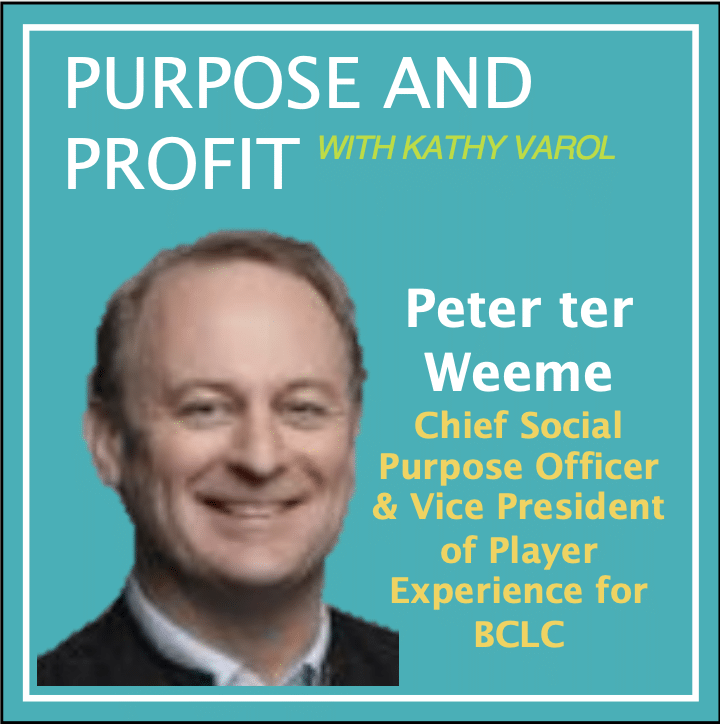Show Notes:
Peter ter Weeme is the Chief Social Purpose Officer & Vice President of Player Experience for BCLC, the British Columbia Lottery Corporation. Peter is responsible for the corporation’s social purpose commitment, overall reputation management, end-to-end player experience, and marketing strategies. His mandate is to transition BCLC to a purpose-driven organization.
Peter is a 25-year veteran of the values-driven marketing, sustainability, and social purpose movement. His professional experience spans the world of corporate, government, and non-profit clients in North America, Europe, and Asia. He has lived and worked in Canada and the Netherlands, as well as India where he advised companies on a range of values-based issues.
Previously Peter was the EVP, Purpose and Brand Citizenship for Elevator Strategy (now Palmer Stamnes DDB), a Vancouver-based marketing and communications firm that works at the intersection of data, emerging technologies, and social purpose. With an MBA specializing in environmental management, he has founded two successful consultancies and previously led the marketing and communications at Mountain Equipment Co-op, Canada’s national retail leader in social and environmental responsibility.
In this episode we discuss:
- Turning a vice into a virtue
- The mess inherent in progress
- The largest non-tax source of revenue for British Columbia
- The psychological impact of being for something, as opposed to against something
Key Takeaways:
- Early in our conversation, we talked about the importance of transparent dialogue for creating healthy communities while removing stigma and taboo. The Netherlands is a great example of a society that’s done that across many areas. For industries like gambling and alcohol, education and transparent dialogue are incredibly important to remove stigma, raise awareness, and provide support for the population that cannot safely partake in these activities. There shouldn’t be any shame in opting out. Whether you cannot safely partake, or you just don’t want to partake. What does that mean for you? There are small things you can do, for example, next time you’re out with colleagues or friends, don’t assume everyone wants to drink. Remove having an adult beverage as the assumed default setting.
- When it comes to protecting the planet and society, collectively we have failed. Talking openly about what’s failed and what’s broken is the first step in finding a new path forward. You need to know where you are before you can chart a path to where you want to be. The United Nations Sustainable Development Goals show in detail what’s broken, and where we need to get to for a sustainable planet and equitable society. As your company works on its ESG strategy, connect that strategy back to the Sustainable Development Goals, to clearly show how you’re contributing to collective action to help solve our most pressing global challenges.
- As your company travels your ESG journey, transparency is incredibly important. Transparency is a fundamental ingredient to create a culture of continuous improvement. This is where internal communication and external ESG reporting come into play. Collectively we’re evolving the way capitalism and corporations work, and by doing what’s never been done before, there will be failures along the journey. There is no doubt that we will be collectively stronger if we are humbly willing to share our failures openly, so others can learn from them. This transparency does two things: First, it removes the misconception that failure can be avoided on the road to progress; second, we don’t have time for everyone to make the same failures along the way. With the collective challenges we’re facing, impatience is a virtue.
References:
- Connect with Peter on LinkedIn
- British Columbia Lottery Corporation (BCLC)
- GameSense
- The Bonfire of the Vanities written by Tom Wolfe
- The Bonfire of the Vanities directed by Brian DePalma
- Canadian Business for Social Responsibility
- End AIDS India
- The Hero Trap by Thomas Kolster

